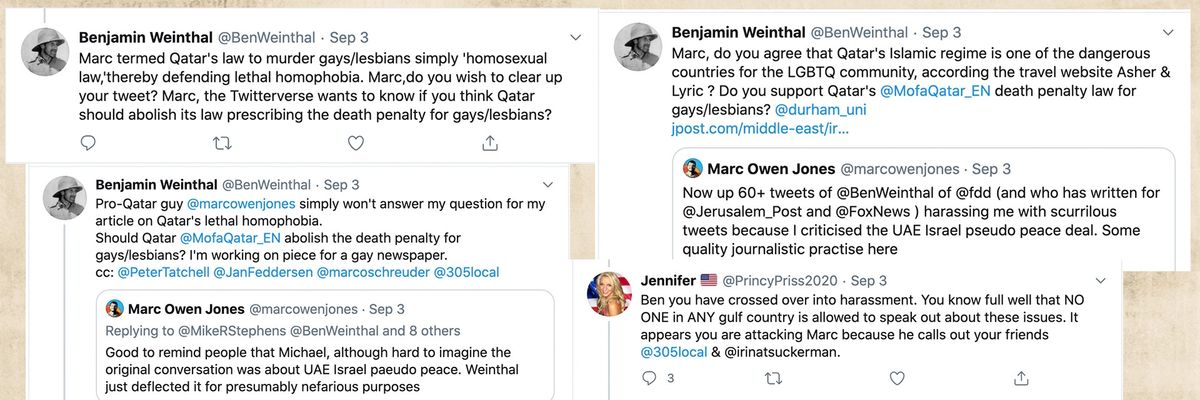In recent weeks, I, along with other academics, have been subject to a smear and harassment campaign by Benjamin Weinthal, who is both a research fellow at the hawkish Washington, DC-based think tank Foundation for the Defense of Democracies, and a “European correspondent” for the Jerusalem Post.
Weinthal’s attack appeared to be a response to an article I had written on September 2 that critiqued the recent UAE-Israel “peace deal” as a public relations stunt. (FDD appears to have developed a close relationship with the United Arab Emirates, at least since 2017.) Because of my critique, Weinthal claimed on Twitter that I am a “zealous advocate” for the Qatari Ministry of Foreign Affairs. (I’m actually a professor).
Within the next 48 hours, Weinthal sent me a veritable flood of some 90 tweets, most of them demanding to know my stance on Qatar’s laws pertaining to homosexuality. He also made numerous completely unfounded and defamatory accusations of homophobia, such as, “Marc does not oppose Qatar's death penalty for gays.”
Anti-Qatar hostility
I was not his only target. Weinthal made other baseless claims against academics living in Qatar or those he perceived to be connected to Qatar. He inferred that Andreas Krieg, a professor at King’s College London, was a Nazi sympathizer, having previously accused him of working for Doha.
He also threatened to report another Qatar-based academic, Gerd Nonneman, a professor at Georgetown University Qatar, after Nonneman questioned Weinthal’s bizarre behavior. Back in August 2019, Weinthal launched a similar tirade against Justin Martin, another Qatar-based academic, demanding to hear his views on LGBTQ rights in Qatar.
Although Weinthal has written for FDD in support of LGBTQ communities in the Middle East, his attacks on us potentially endanger minorities while masquerading as defense of gay rights.
For example, if Weinthal believes that members of the LGBTQ community in Qatar are at risk, and he constantly tries to bait someone — i.e. me — living in Qatar to debate a topic that he says he believes to be potentially life-threatening, then he is showing a reckless disregard for their safety. Moreover, he likely is unaware of the sexuality of his targets for harassment, which risks endangering the rights he claims to be defending by drawing attention to their stance on an issue he has already highlighted as “lethal.”
FDD’s track record of harassment
Weinthal himself has developed a reputation as an attack-dog for the anti-BDS movement. Weinthal has also admitted that he exaggerates accusations of anti-Semitism when attacking critics of Israeli policies.
This would not be the first time FDD, which was founded to “enhance Israel’s image in North America,” has been accused of attacking activists, journalists, and academics whose views do not align with its hawkish Middle East politics. FDD appeared to have a thinly veiled collaboration with IranDisinfo, a project that was funded by the U.S. State Department purportedly to counter foreign propaganda. IranDisinfo fell into disgrace after it was found to be trolling journalists, activists, and academics, many of whom are Americans, for not being sufficiently hostile to the Iranian government.
With the thaw in relations between the UAE and Israel, it’s not surprising that Weinthal has diverted some of his attention to attacking those connected to the UAE’s nemesis — Qatar — which seems to reflect FDD’s hawkish pro-Israel stance and close relationship with the UAE. Indeed, it is no secret that FDD writers have been involved in the campaign to demonize Qatar in Washington, publishing at least four anti-Qatar op-eds in 2017.
In May of that same year, FDD hosted an anti-Qatar conference in Washington, DC just before the crisis that prompted the UAE-Qatar rift. FDD had reportedly been persuaded by Republican fundraiser Elliot Broidy to hold the conference, and the New York Times later revealed that Broidy had been paid $2.7 million for his services by George Nader, an advisor to UAE Crown Prince Mohammed bin Zayed. This UAE money, via Nader and Broidy, reportedly bankrolled the FDD conference.
A series of leaked emails published in 2017 revealed that Yousef al-Otaiba, the UAE Ambassador the United States, communicated often with FDD CEO Mark Dubowitz and FDD senior counsel John Hannah, former Vice President Dick Cheney’s national security adviser. The discussions included pointed criticism of Qatar, suggesting a strategic collaboration between the UAE and FDD.
FDD’s selective bias
Weinthal’s tweeting habits certainly reflect an anti-Qatar bias. Between May 2011, and September 2020, he has only tweeted about the UAE approximately 73 times, while he has discussed Qatar 906 times, something that has increased notably since August 2019— the same month Weinthal wrote an anti-Qatar analysis in the Jerusalem Post that was republished on FDD’s website. His concern with LGBTQ rights seems to largely exclude the UAE, despite the fact that its laws pertaining to homosexuality are barely any different from Qatar’s.
Weinthal’s invectives highlight an alarming use of disinformation as harassment, but it also raises questions about a continuing, albeit murky relationship between the United Arab Emirates and FDD.
Weinthal is using defamatory harassment against analysts and academics with whom he disagrees. It is unclear why FDD and the Jerusalem Post continue to allow one of their contributors to engage in online bullying — seemingly without censure. It is ironic that an organization purportedly devoted to promoting democracy can seemingly condone behaviors that contribute to chilling the exercise of free speech.
















